
Dr. Ismail Haque
Assistant Professor (Department of Geography)
Department of Geography, Faculty of Sciences, Jamia Millia Islamia, New Delhi-110025
Ismail Haque is an Assistant Professor at the Department of Geography, Faculty of Sciences, Jamia Millia Islamia, New Delhi. An alumnus from Jawaharlal Nehru University, he completed his doctoral studies from the Centre for the Study of Regional Development (CSRD), JNU in 2022. He joined the Department of Geography (JMI) as Assistant Professor in April 2023. Currently he is also serving as Visiting Fellow (Honorary) at the Impact and Policy Research Institute (IMPRI), New Delhi.
He has more than five years of experience working with various prestigious policy think tanks in India and was engaged in diverse assignments related to contemporary urbanization, population and development issues in the cities of Global South.
His current research interests are interdisciplinary more broadly in the area of critical urban/population geography and spatial demographic research, and specifically in the field of sustainable urban development and inclusive cities, urban housing and its socio-political dimensions, spatial aspects of neighbourhood inequality/urban segregation, spatial demography, including geospatial data modelling and research methods.
Dr. Haque has published several research papers as lead and co-author in internationally reputed scientific journals including Journal of Biosocial Science, Habitat International, Spatial Demography, and Spatial and Spatio-temporal Epidemiology. He received three prestigious travel awards to attend international conferences in abroad: The 3rd Asian Population Association (APA) Conference 2015 (Kualamlampur, Malayasia); International Geographical Congress (IGC) 2016 (Beijing, China); 4th Asian Population Association (APA) Conference 2018 (Shanghai, China). He completed his B.Sc. in Geography with English and Economics from Dumkal College, University of Kalyani (2010) and M.Sc. in Geography from Aliah University, Kolkata (2012).



